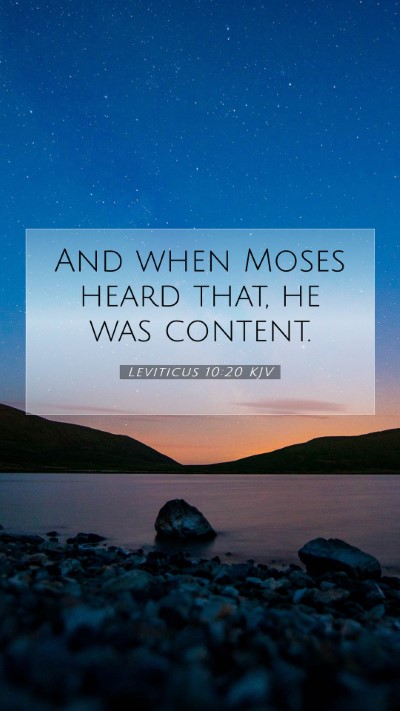Understanding Leviticus 10:20
Bible Verse: Leviticus 10:20
Verse: "And when Moses heard that, he was content."
Overview
Leviticus 10:20 serves as a significant moment of divine communication and understanding within the context of Aaron's priestly duties and the serious nature of their responsibilities. This verse reflects a crucial event following the deaths of Aaron's sons, Nadab and Abihu, who had offered unauthorized fire before the Lord. The response of Moses in this verse signifies acceptance of God's will and the need for obedience in priestly service.
Commentary Analysis
- Matthew Henry:
Henry emphasizes that Moses' contentment was not only an emotional response but also a reflection of deeper obedience to God's decrees. After witnessing God's judgment on Aaron's sons, Moses’ acceptance articulated the necessity of adherence to divine instructions, underscoring the seriousness of holiness in worship.
- Albert Barnes:
Barnes highlights that Moses’ reaction exemplifies a leader's submission to God's determinations. He points out that Moses did not mourn or question God's actions but accepted them as righteous. Barnes interprets this as a profound recognition of God's sovereignty over human affairs, particularly in the religious order.
- Adam Clarke:
Clarke’s commentary digs into the theological implications of the verse, stating that Moses’ contentment was indicative of his understanding of God's justice. Clarke notes that acceptance of God's decision is crucial for leadership, fostering an environment of reverence and compliance to God's will, especially in the context of worship.
Theological Implications
The reaction of Moses may be interpreted as a profound understanding that God's ways, even in judgment, are well-ordered and serve a larger divine purpose. This reinforces the belief that worship must be approached with the utmost reverence and adherence to God's standards.
Lessons and Applications
- Significance of Obedience:
The passage stresses the necessity of following divine ordinances in worship. Readers can bear in mind that the means of approaching God must align with His instructions, which brings about a serious reflection on personal worship practices.
- Acceptance of Divine Will:
Moses' contentment serves as a model for believers to accept God's will, even when it is difficult to understand. This helps in developing a trusting relationship with God, promoting peace in moments of divine correction or judgment.
- Leadership in Spiritual Affairs:
Moses' example illuminates the role of leaders in spiritual contexts, showing that they should accept and communicate God’s truths faithfully, even when it involves difficult teachings associated with accountability and holiness.
Cross References
- Numbers 3:4: This verse recounts the fate of Nadab and Abihu, giving context to their actions and God's response.
- Exodus 30:9: Relates to the guidelines on offerings and the necessity of adhering to God's commands concerning worship.
- 1 Peter 1:16: Reflects the call to holiness and offers the New Testament context for understanding God’s holiness.
Conclusion
Leviticus 10:20 invites readers into a deeper biblical exegesis regarding the behavior of worship leaders and the seriousness of adhering to God's commands. Reflecting on this passage encourages believers to strive for the holiness required in their approach to God while accepting His will with grace and humility. Such reflections enhance our bible study insights, guiding both personal and communal Bible study topics within groups.


